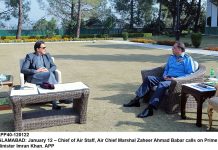Published on: August 22, 2025 1:35 AM
 Senior Provincial Minister for Information, Transport and Mass Transit, Sharjeel Inam Memon, stated that since June, rainfall caused by climate change has led to loss of life across various regions of the country.
Senior Provincial Minister for Information, Transport and Mass Transit, Sharjeel Inam Memon, stated that since June, rainfall caused by climate change has led to loss of life across various regions of the country.
According to him, 427 deaths occurred in Khyber Pakhtunkhwa, 165 in Punjab, 40 in Sindh, 22 in Balochistan, 56 in Azad Kashmir, and 8 in Islamabad. In Tharparkar, 198 mm of rainfall resulted in the deaths of 3 individuals and 18 livestock. During a press conference in Karachi, the Minister said that on August 19, the city recorded an average of over 120 mm of rainfall. Specific areas saw even higher levels: 246 mm in Manghopir, 190 mm in Korangi, 175 mm in Gulzar-e-Hijri, and 149 mm in North Nazimabad. He noted that continuous rainfall led to urban flooding and traffic disruptions, which could have been mitigated had the rain occurred intermittently.
Sharjeel Memon stated that most deaths in Karachi were caused by electrocution, and criticized K-Electric and HESCO for their incompetence, as power outages lasted up to 48 hours in some areas. Despite this, municipal bodies, the mayor, and provincial administration remained active on the streets. Drainage channels had been cleaned in advance, and heavy machinery was deployed for water disposal, although some shortcomings did occur.
He expressed regret over the public’s suffering and offered an apology on behalf of the Sindh government. However, he condemned certain media houses for launching a coordinated campaign against the government. He pointed out that parties criticizing the current administration had themselves witnessed hundreds of deaths during minor rainfalls in their own tenures, leaving cities paralyzed for days.
The minister said the Sindh government had declared a public holiday and urged citizens to stay indoors. According to the Meteorological Department, the rain spell is expected to end soon. He praised the performance of all town chairmen and emphasized that such moments require collective action, not political point-scoring. He added that the Meteorological Department had not forecast heavy rain on August 19, but an unexpected spell occurred. The provincial government, from the Chief Minister to sanitary workers, remained active day and night, fulfilling their responsibilities. He stressed that political opportunism should be avoided during such crises. Responding to a question about Farooq Sattar, he said he had no objection to sitting with him, but noted that Sattar has a history of constant criticism. He questioned why Sattar boycotted the elections if he was genuinely concerned about municipal institutions. He remarked that some individuals in MQM issue statements merely to assert their presence.
Sharjeel Memon recalled the 2022 floods, saying no part of the province remained dry, yet the government managed to stabilize the situation within hours. He explained that the drainage system is based on outdated designs, and regardless of who holds office-be it the Chief Minister or Mayor-the drainage follows the same old routes. He reiterated that K-Electric and HESCO disappointed citizens, with power outages lasting up to 48 hours in several areas. However, he commended Murtaza Wahab for being present everywhere. He noted that even developed countries are facing severe challenges due to climate change, and warned that a cloudburst could lead to even worse conditions. He acknowledged the public’s distress but emphasized that no magical solution exists to instantly resolve everything. He said K-Electric’s incompetence was most evident during the rains.
On the topic of bail granted to the PTI founder, he extended congratulations and affirmed that respecting court decisions is mandatory for all. In response to a question, he said discussions cannot be based on assumptions, and any constitutional amendment would be deliberated across all party forums. He stated that damage assessments would be conducted after the rain spell ends. He highlighted that settlements and mosques have been built inside Gujjar Nala, and even some media houses and government offices are constructed on drainage channels. He stressed that the current infrastructure is unreliable and incapable of addressing climate challenges. Issues in the Red Line BRT are also due to utility line conflicts.
He concluded by saying that those who perform well should not be criticized. The Governor represents the entire province, and everyone should work together. Politics should not be done in the name of service. Sharjeel Memon emphasized that Karachi is a city where thousands of people from across the country come daily for employment. He urged the federal government to pay attention to this city, which contributes 70% of the national revenue and offers the best healthcare facilities in Pakistan.




.jpg)



